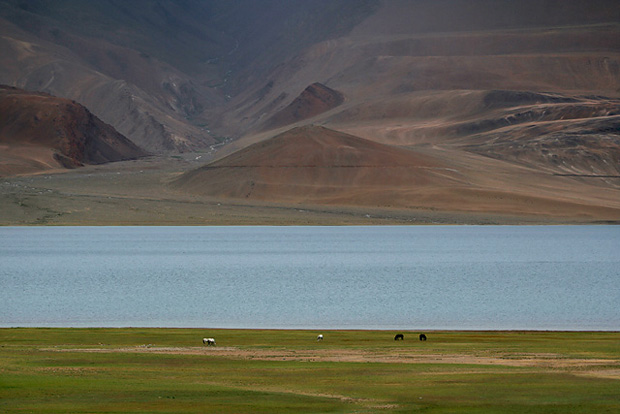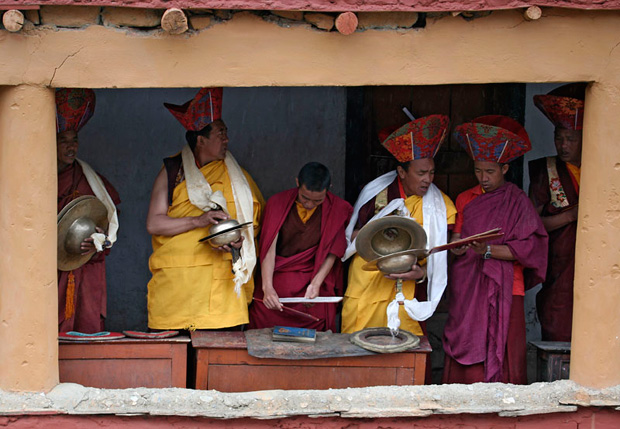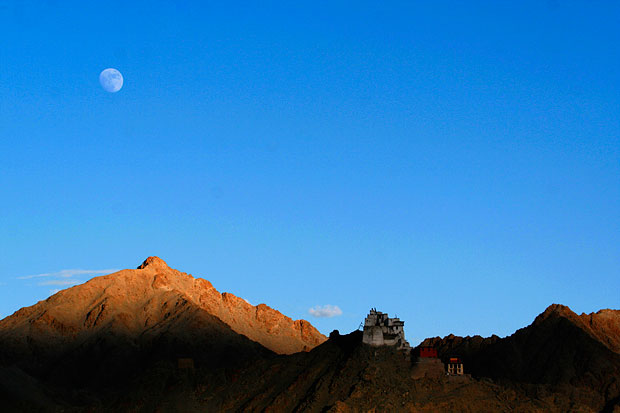I have written all good things about people of Ladakh in my earlier posts in this series. Ladakhis are usually very warm and cheerful people and always carry an infectious smile (Read: Ladakh – Good Samaritans and Ladakh – Cheerful People). But in my two months of wandering in the mountain country, not every experience was good.
While in Ladakh, we had made an attempt to travel by public transport as much as possible. But there were a few exceptions, like the time we hired a bike to get to Pangong Lake to ensure that we could stop and go as we wished, or when we took a cab to get us to Tso Moriri Lake in time for a festival. The cab dropped us at Korzok Village on the bank of the lake and returned to Leh. Knowing that the date of arrival of next bus is still many days away (read about public transport in Ladakh, where I talk about buses to some places being available at an interval of every 10 days), we scouted for options to get back to Leh.

Tso Moriri Lake
Our initial plan was to look for seats to share in a returning cab or even a small truck. Since this was festival time, the inflow of tourists was higher than normal and there was a good chance to find taxis returning to Leh with some seats empty. After looking around at all the hangouts in the village, we found a group of four Israelis willing to take us back with them to Leh. These people had taken a cab from Leh to Tso Moriri and were planning to get back to town next morning, stopping for a night at Tso Kar. It suited us well. We had not planned a visit to Tso Kar earlier, but it would be good to get a glimpse of the lake, even if it is for just one evening. Although it was not necessary, we informed their driver Tashi that we would be joining the group on the next part of the journey. In a semi-inebriated condition that evening, Tashi smiled and nodded cheerfully.

Celebrations – Korzok Gustor Festival on the banks on Tso Moriri
The next morning, we packed our bags and waited to hear from the group of Israelis when they are ready. At about 11am, one of them walked into our guest house to deliver a bad news – ‘Tashi is refusing to take you two in the cab!’ For a moment we were worried. Because we had managed to get transport yesterday, we did not bother to look further. It meant getting stranded in Korzok for at least a day, or more if there is no transport available even on the next day.
What ensued was a long argument between Tashi and us. His case was that the cab, a Tata Sumo, would not be able to pull a load of additional people in the mountain roads. It did not seem to make sense. Drivers take 10 passengers along the Manali – Leh highway in Tata Sumos every day, while here it would be just six people including us today. And if he did not want to take us, he should have refused yesterday evening when we volunteered to inform him about us joining the group. After a short exchange of words with Tashi that actually left us struggling to breathe in Tso Moriri’s this air, Tashi suddenly obliged but refused to talk to us any more.
Later in the evening when we reached Tso Kar, Tashi reminded of us struggling to accelerate in a steep slope on the way where he had to ask all of us to get out and walk a short distance. Tashi had attempted to go off road and take a steep short cut, but the cab had refused to go further. He recalled the incident in support of his argument in the morning. Now in a better mood, he also said he was very upset because we had raised our voices in Tso Moriri.
That morning, we had tried to keep a calm and worked hard to keep our voices low even when we expressed unhappiness with Tashi and argued that he can’t refuse to take us. But having walked briskly to his cab and blabbering a few sentences breathless, talking further was a struggle and we might have sounded discourteous as we spoke with difficulty, almost chokingly. I explained it to Tashi and apologized if we had sounded rude. In a region where people are so friendly that anyone getting angry is almost unimaginable, we might have sounded as if we had crossed some limits.
We finally made amends with Tashi, who opened up a bit after this conversation in Tso Kar. But it still remains a puzzle why he agreed to take us in the first place and refused later. Perhaps it was the effect of whiskey, which kept him in a generous mood when we spoke to him first!
About two weeks after we left Tso Moriri, we were to have some more uncomfortable experiences (link to a really long post on a trek in Zanskar, part of which are some unhappy experiences) while trekking in the heart of Zanskar.
A punctured bike got us stranded in Likir Village, but we were helped by complete strangers to get back to Leh that evening.
I was unsure what to do when I discovered the flat tyre. I had no clue about fixing punctures and there was no place in Likir to get it fixed either. When I called Namgyal, the person who rented us the bike, he suggested that we take the bike to the highway and flag a truck. But Likir is a few kilometers away from the highway and I wasn’t even sure if we could push the bike so far. Without any fuss, Namgyal agreed to send one of his mechanics to Likir. Incidentally Likir is 60km away from Leh. “Give the mechanic some tip,” he said, “otherwise it should not be problem.”
In the next thirty minutes however, I had managed to get the bike to the main road and started flagging trucks. With no cell-phone signals available, we could not inform Namgyal about our progress.
It was a while before we could find a truck heading towards Leh. A few BRO trucks passed us, but none were heading towards Leh. One of them stopped to ask us what the problem was, but they were only going a short distance ahead. An army jawan in the truck got down and started flagging vehicles for us.
An empty truck on its way to Leh stopped a few minutes later. After a brief discussion with the jawan, the driver agreed to take us and the bike to Leh. The jawan and the cleaner assisted us in lifting the bike into the truck. After saying ‘thank you’ and ‘good bye’ to the friendly army man, we were quickly on our way to Leh. We decided to look out for Namgyal’s man on the way, stop him and ask him to return to Leh.
The driver was a talkative person from Punjab who had a good experience of driving in the Ladakh region. He spoke for a long time talking about his life in Ladakh and asked questions about our journeys. He seemed to enjoy being in Ladakh and driving through its mountainous regions. Infact he was one of the few immigrants I had seen who did not complain about the harsh terrain and difficult life. His favourite place was in Nubra Valley beyond Hunder, where, he described, the mountains are tall and steep. But we discovered another reason later – his wife happened to be from those parts! This area in Ladakh was out-of-bounds during my visit, but was recently thrown open to visitors by the Government of India.
As we talked, we saw two men on an Enfield carrying a spare tyre going in the opposite direction, suddenly crossing us at a steep curve. They had gone past us before we could even wave at them.
We reached Leh just after sun down. Our troubles however did not end there. The trucker’s destination was just before the town, but he agreed to drive in a bit and find a mechanic for us. The first puncture-shop guy refused to help us, as he primarily worked on truck tyres and did not know how to remove a two-wheeler’s rear wheel. The truck driver came to our rescue again. He drove us to a bike mechanic’s shop, one owned by a friend of his, a few hundred meters ahead. The plan was to get the mechanic to remove the wheel, take it to the puncture shop, get it back to the mechanic’s shop again and then re-assemble the wheel.
Having worked this arrangement, the truck driver took leave from us. At the end of all this, he refused to take any money for his help!
The mechanic looked at the bike and sternly said that he normally never touches the bikes taken on rent, but he was doing this since the driver was a good friend of his. Having said that, we got into a conversation and found out that he worked in Bangalore for a few years. Sometimes I wonder if there comes a day when everyone you meet anywhere in the world would have worked in Bangalore some time or the other. Never mind, he now took an extra interest in the work. After he removed the wheel, we took it to the puncture shop, got it fixed and returned back. And then it was a déjà vu. He refused to take any money!
We finally reached Namgyal’s bike shop just before he was to close for the day. The news from the folks who had gone to Likir was that they searched all around for us and were finally about to head back. I apologized for the trouble and explained him what happened. So how much should we pay him for the services of those who went looking for us? Well, he refused to take any money!
Here is the list of all posts on Leh town, written as part of Ladakh Travelogue series.
- Arriving at Leh, with just Rs.50 in hand requesting deferred payment from a taxi ride.
- Leh, the first impressions and an overview of the town.
- Spending an evening at Shanti Stupa.
- Seeing places – Leh Palace, Namgyal Tsemo Gompa and Soma Gompa
- The guesthouse at Leh with friendly owners, a spacious garden and some Ladakhi food.
- The complete guide to Leh – places to see and things to do.



